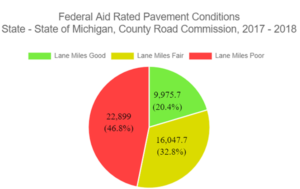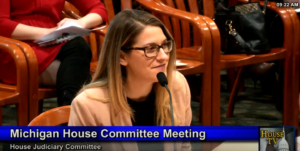Revenue sharing increase highlights Gov. Whitmer’s FY21 budget
 Michigan counties would see a $5.7 million boost to state revenue sharing payments under spending plans released today by Gov. Gretchen Whitmer for fiscal year 2021.
Michigan counties would see a $5.7 million boost to state revenue sharing payments under spending plans released today by Gov. Gretchen Whitmer for fiscal year 2021.
In her second budget plan, Whitmer advises the Legislature to appropriate $232.2 million in statutory revenue sharing for counties, a roughly 2.5 percent increase from FY20 levels, from an $11 billion General Fund. The governor’s proposal would extend a recent trend of modest increases in revenue sharing as Michigan emerged from the Great Recession.
Whitmer also is recommending $7.2 million to support recommendations of a joint county-state Jail and Pretrial Incarceration Task Force and $40 million in grants for local governments to address flooding and infrastructure issues created by rising water levels around the state.
“Any increase is good news for our members, who are still struggling with the effects of the Great Recession and state limitations on property tax revenue,” said Stephan Currie, executive director of the Michigan Association of Counties. “Still, in other areas of the budget, resources to counties are flat or even trending downward.”
Currie noted such areas as:
- Funding for county veteran services grants: $2 million recommended for FY21, down from $4 million in FY20.
- Funding for Secondary Road Patrol for county sheriffs: $11.1 million recommended for FY21, down from $13 million in FY20.
- Reimbursements to county jails for housing state prisoners: $14.8 million recommended for FY21, flat from FY20.
- Funding for “essential local public health services”: $51.4 million recommended for FY21, flat from FY20.
“We agree with the governor’s remarks this week that funding for local services is a crisis created by many decisions over many years in Lansing. We appreciate her commitment to a conversation on addressing that trend. Now is the time to do so, when Michigan’s economy is moving at a solid pace,” Currie argued.
FY21 Estimated Revenue Sharing by County
For more information on the state budget, contact Deena Bosworth at bosworth@micounties.org.
Who controls your county buildings?
 A bill discussed in the Senate Local Government Committee this week would mandate that a local unit of government allow an elected official to place his or her non-political constituent informational materials in their buildings.
A bill discussed in the Senate Local Government Committee this week would mandate that a local unit of government allow an elected official to place his or her non-political constituent informational materials in their buildings.
Senate Bill 719 sponsor Sen. Peter Lucido (R-Macomb) also referenced a substitute to the bill that prohibits anyone from denying access to an elected official who wished to hold a constituent informational meeting at any state or local governmental office that is open to the public.
MAC testified in opposition to the legislation on the grounds that the Legislature should not enact a law prescribing what a county must do in buildings owned by the county. The bill and substitute bill, as written, do not limit the places within county buildings where any elected official from the area can place their materials or hold public meetings. And they would not allow a county to deny a time or place for such meetings, even if other meetings or functions were already scheduled for the space. Further, they do not limit the quantity of materials that may be placed anywhere an elected official chooses, nor do they specify that access can be denied when the buildings are not open for business.
MAC will continue to work with the bill sponsor to protect local control of locally owned facilities. For more information on this issue, contact Deena Bosworth at bosworth@micounties.org.
Senate committee briefed on child welfare corrections
 The Senate Families, Seniors and Veterans Committee heard an update (attachment) from the Michigan Department of Health and Human Services (MDHHS) on state’s Children Rights modified Implementation Sustainability and Exit Plan (ISEP). Senior Deputy Director for the Children’s Services Agency (CSA) JooYeun Chang provided an overview from since the state became the subject of federal scrutiny after it settled Dwayne B. v Granholm (U.S. Eastern District Docket No. 06-13548) in 2008, which led to a consent decree requiring several state changes.
The Senate Families, Seniors and Veterans Committee heard an update (attachment) from the Michigan Department of Health and Human Services (MDHHS) on state’s Children Rights modified Implementation Sustainability and Exit Plan (ISEP). Senior Deputy Director for the Children’s Services Agency (CSA) JooYeun Chang provided an overview from since the state became the subject of federal scrutiny after it settled Dwayne B. v Granholm (U.S. Eastern District Docket No. 06-13548) in 2008, which led to a consent decree requiring several state changes.
The hope was that the ISEP could help DHHS exit federal monitoring within the next few years. But in 2018, a child welfare audit showed the state had undercounted the number of abused, and that homes used by relatives for child placement did not meet safety standards.
In June 2019, the ISEP was modified again in recognition of progress to the MDHHS child welfare system resulting in a focused agreement on six principles: safety, children’s needs, families and communities, placement, reunification and permanency and services. Chang emphasized progress to reduce CPS call wait times by centralizing the intake process and noted the number of dropped or abandoned calls had fallen from 1,400 to below 150, as of January.
Based on the tweaked agreement, to exit the ISEP, MDHHS must meet all conditions and maintain performance standards for at least two consecutive reporting periods. And it cannot have any outstanding requests for corrective action plans. Twenty-six jurisdictions are under a similar consent decree to Michigan’s.
The state also is implementing new federal requirements under the Family First Prevention Services Act of 2018. The governor’s FY21 budget includes $8.6 million for programs to prevent children from entering foster care and to reduce the utilization of residential care for foster children. According to the governor’s plan, costs will be offset by estimated savings of $11.3 million ($5.3 million General Fund) resulting from fewer children entering the foster care system. The governor also is requesting $20.6 million to complete the first phase of the replacement of the Michigan Statewide Automated Child Welfare Information System (MiSACWIS) with a cloud-based system. And the budget calls for $11.3 million ($5.8 million General Fund) for this new system as a fiscal year 2020 supplemental appropriation. The entire upgrade for all phases is planned to be completed by FY25.
For more information on this issue, contact Meghann Keit at keit@micounties.org.
Bills would redistribute funds from bottle deposits
 A bipartisan package of bills intended to prevent bottle deposit fraud would also redistribute funds generated by unclaimed bottle deposits, sponsors told a House committee this week.
A bipartisan package of bills intended to prevent bottle deposit fraud would also redistribute funds generated by unclaimed bottle deposits, sponsors told a House committee this week.
House Bills 5422-5425 received a hearing this week in the House Regulatory Reform Committee.
The heart of the bill package is HB 5423, by Rep. Brandt Iden (R-Kalamazoo), which would reconstitute how the “escheat” money (or unredeemed deposits) is spent. Current law divides the money this way: 75 percent to the Cleanup and Redevelopment Trust Fund for contaminated site cleanup and remediation and 25 percent to reimburse dealers/retailers for losses. HB 5423 would revamp that formula: 20 percent would go to new reimbursements for distributors, 25 percent would continue to reimburse retailers, 15 percent would go to a new Bottle Enforcement Fund to crack down on fraud and abuse and the remaining 40 percent would be split between the Cleanup and Redevelopment Trust Fund and the Renew Michigan Fund, which funds recycling grants, solid waste planning and contaminated site cleanup. Each year, unclaimed deposits generate about $40 million in revenue.
Since the bottle deposit law was adopted via voter initiative in the 1970s, any change would require a ¾ vote in each chamber.
MAC does not yet have a position on these bills.
For more information on this issue, contact Michael Ruddock at ruddock@micounties.org.
Deadline is Feb. 21 on veteran service grants
 Counties that filed Letters of Intent now have until Feb. 21 to formally apply with the Michigan Veterans Affairs Agency (MVAA) for the FY20 County Veteran Service Fund grant monies.
Counties that filed Letters of Intent now have until Feb. 21 to formally apply with the Michigan Veterans Affairs Agency (MVAA) for the FY20 County Veteran Service Fund grant monies.
Per law, each grant award will consist of a $50,000 base payment. Per capita payments also will be processed based on the county’s veteran population. MVAA will review applications between Feb. 21 and Feb. 28. It will announce awards and denials on March 2.
An FY20 supplemental appropriation included $4 million for the fund after months of negotiations between the Legislature and the Governor’s Office. The letter from the agency states, “(T)he goal and intent of these grant dollars are to enhance and improve county veteran service operations in an effort to connect more veterans to their benefits and provide consistent access to services throughout the state.”
If counties have any questions about uses of the funds, please consider connecting with surrounding counties or MAC. For questions of MVAA, contact MVAAGrants@michigan.gov.
For other questions or information, contact Meghann Keit at keit@micounties.org.
 State offers free naxolone to county jails
State offers free naxolone to county jails
County jails may request naloxone via a new portal built by the Michigan Department of Health and Human Services (MDHHS). The department eventually plans to offer the drug, used to reverse the effects of an opioid overdose, to a variety of community organizations. MDHHS is recommending counties issue the drug to high-risk individuals at discharge from jail. (See the letter sent to Michigan sheriffs from MDHHS.)
You can access the portal here.
For more information, contact Jared Welehodsky of MDHHS at 517-284-4761 or welehodskyj@michigan.gov.
Feb. 11 webcast to focus on broadband gap
 County leaders are encouraged to view a Pew Charitable Trusts webcast, “How to Bridge the Broadband Gap: A Conversation with State Leaders,” which will run from 9 a.m. to noon on Feb. 11.
County leaders are encouraged to view a Pew Charitable Trusts webcast, “How to Bridge the Broadband Gap: A Conversation with State Leaders,” which will run from 9 a.m. to noon on Feb. 11.
“Though access to high-speed, reliable internet is an increasingly critical tool for modern American life, the Federal Communications Commission estimates that at least 21 million Americans still lack broadband access. Other counts suggest this number could be as high as 162 million. Although much of the conversation about expanding broadband access has focused on the federal and local levels, states are taking decisive steps to expand this critical service to communities that lack it or are underserved.
Tune in for insights on:
- New research on 5 steps to effectively expand access
- State promising practices
- “Universal truths” of successful initiatives
Click here for details and to watch live on Feb. 11.

 As part of the
As part of the  National news from NACo
National news from NACo Gov. Gretchen Whitmer’s road bonding plan, highlighted in her
Gov. Gretchen Whitmer’s road bonding plan, highlighted in her  MAC has joined with six other organizations representing local governments, environmental causes and schools to urge defeat of a bill that guts local oversight over the location and operations of sand and gravel mining in Michigan.
MAC has joined with six other organizations representing local governments, environmental causes and schools to urge defeat of a bill that guts local oversight over the location and operations of sand and gravel mining in Michigan. County Commissioners across the state have been hearing for years of the backlog at the state’s Center for Forensic Psychiatry. Defendants are sitting in county jails waiting to be evaluated to determine competency to stand trial, and even if they are deemed incompetent, they could then be sitting in jail for long periods of time before they are moved somewhere to get treatment. Not only does this strain county jail resources, it can lead to defendants’ further mental health deterioration and delays the process for victims.
County Commissioners across the state have been hearing for years of the backlog at the state’s Center for Forensic Psychiatry. Defendants are sitting in county jails waiting to be evaluated to determine competency to stand trial, and even if they are deemed incompetent, they could then be sitting in jail for long periods of time before they are moved somewhere to get treatment. Not only does this strain county jail resources, it can lead to defendants’ further mental health deterioration and delays the process for victims. Few actions can be as effective for county advocacy as local officials coming to Lansing to talk with legislators or testify before legislative committees. MAC encourages county commissioners and administrators to use every opportunity they can to participate this way in the policy-making process.
Few actions can be as effective for county advocacy as local officials coming to Lansing to talk with legislators or testify before legislative committees. MAC encourages county commissioners and administrators to use every opportunity they can to participate this way in the policy-making process. On Jan. 1, 2021, counties must have a plan and changes in place to comply with the law on E911 (Enhanced 911 services).
On Jan. 1, 2021, counties must have a plan and changes in place to comply with the law on E911 (Enhanced 911 services).





